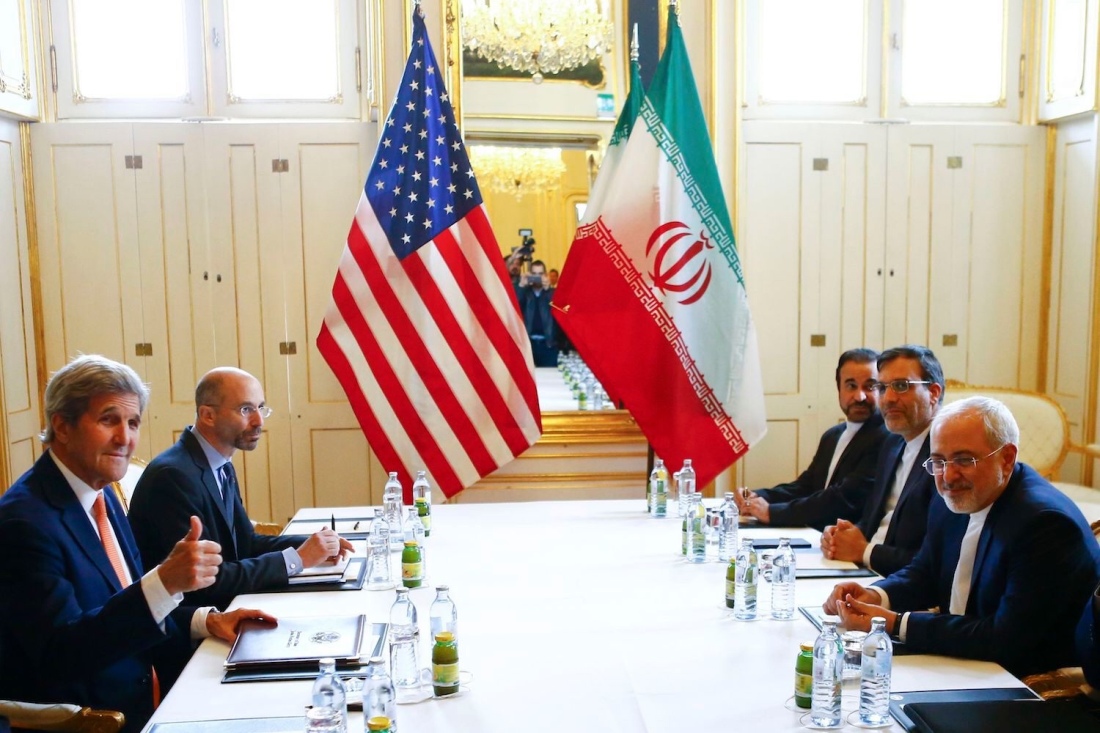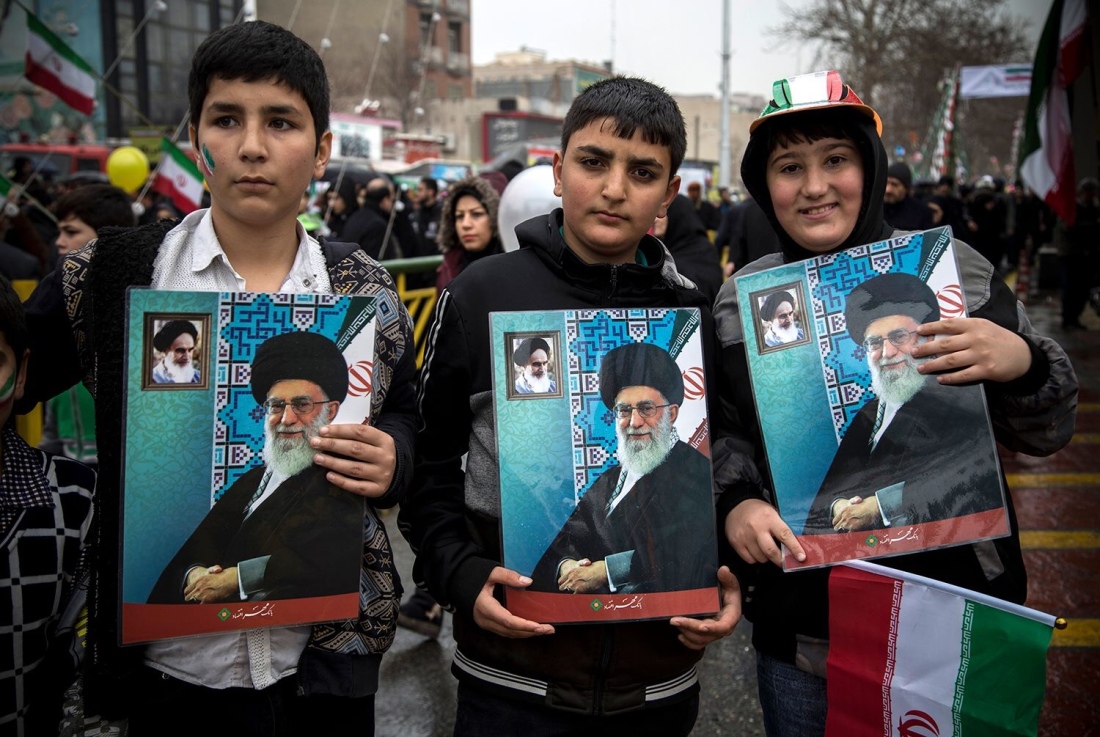
For Many Iranians, Staying In the Nuclear Deal No Longer Makes Sense
Talks have little appeal because Tehran is convinced that Trump can’t be trusted to negotiate in good faith. And there isn’t much political support for observing what’s left of the deal while Washington wages economic war.
Saheb SadeghiSeptember 24, 2019, 3:00 PM
Iran’s President Hassan Rouhani speaks at parliament in Tehran on Sept. 3. ATTA KENARE/AFP/Getty Images
Iran’s announcement on Sept. 4 that it would take a third step to scale back its commitments under the 2015 nuclear deal, as tensions in the Persian Gulf and the Middle East grow, raises questions as to what strategy—or strategies—Iran has adopted to deal with U.S. maximum pressure and how Iranian decision-makers are approaching the possibility of negotiations with the United States.
Iranian President Hassan Rouhani’s announcement that all the restrictions on nuclear research and development will be lifted allows Iran to use advanced centrifuges that are capable of enriching uranium 10 to 20 times faster than the first-generation machines. With this step, Iran will enrich uranium at a faster pace, and its capacity of enriched uranium will also increase. Since May, Iran has adhered only to its commitment not to increase the number of centrifuges and to activate Fordow.
Fordow is one of Iran’s most important nuclear facilities, built 300 feet underground—and thus cannot be destroyed by aerial bombings. Iran used to enrich uranium up to 20 percent at this site before the signing of the 2015 nuclear deal, but under that deal it committed to transforming Fordow from an enrichment facility into a technical laboratory in cooperation with the European Union and promised not to conduct any uranium enrichment there anymore.
The majority of Iranian officials maintain that remaining in the deal cannot be logically, economically, and strategically justified.
The IR-4, IR-6, and IR-8 centrifuges that Iran has said it will use during the third step in a research capacity can accelerate Iran’s nuclear activities to a great extent. It is quite possible that Iran will announce the abandonment of all remaining nuclear deal commitments over the next months and will start enriching uranium at industrial levels with the next-generation centrifuges.
Hundreds of thousands of centrifuges and huge installations are needed for industrial-scale uranium enrichment to generate fuel for power plants. Furthermore, the rate of enrichment depends on the type of the reactor. For example, the Bushehr nuclear reactor requires 5 percent enriched uranium, and the Tehran nuclear reactor needs 20 percent enriched uranium. Iran has even recently threatened to enrich uranium to a level beyond 20 percent.
There are different attitudes toward the withdrawal from the nuclear deal within the Iranian government. Some still believe in salvaging the deal and argue that there is no replacement for it and that Iran must not abandon it despite being under heavy sanctions. Some reformist officials, some diplomats in the Foreign Ministry, and the moderate faction in the Supreme National Security Council belong to this group.
On the opposite side, the majority of Iranian officials maintain that remaining in the deal cannot be logically, economically, and strategically justified. They only differ on how to exit the deal. Many military and government officials called for Iran’s immediate exit from the nuclear deal after the United States refused to extend the sanctions waivers for the eight buyers of Iranian oil in early May, while Rouhani and members of the cabinet insisted on a gradual withdrawal from the accord.
His argument was that the shock of a sudden withdrawal from the deal would escalate the tensions between Iran and the United States and ruin the chance of more diplomatic efforts by European countries to rescue the nuclear deal.
Most polls suggest that the moderates will be completely sidelined in upcoming elections.
It is important to understand that U.S. President Donald Trump’s withdrawal from the nuclear deal and the reimposition of sanctions have put the Rouhani government in its weakest position ever. Most polls and analyses suggest, a few months before the parliamentary elections and less than two years before the presidential race, that the conservatives, who are firmly opposed to Rouhani, will take control of the both the parliament and the government and that the moderates will be completely sidelined.

How Europe Can Save What’s Left of the Iran Nuclear Deal

The Next U.S. President Should Rejoin the Iran Nuclear Deal

How Iran’s Supreme Leader Is Outmatching Trump
Indeed, with increasing U.S. sanctions and the vulnerability of the Iranian economy, most Iranian politicians argue that the country is already in a state of war. Iran regards the full-fledged economic embargo by the United States as, at best, an attempt aimed at regime change and, at worst, a prelude to a full-scale military confrontation.
In such circumstances, negotiating with the United States is Iran’s red line, and hardly anyone in Tehran is thinking of a bilateral negotiation with the Trump administration. The fact that they don’t hear a unified voice from Washington has made their anti-negotiation stance easier to sell. Indeed, in their view, the firing of National Security Advisor John Bolton, who is famous for his warmongering anti-Iran stance, seems to have been due to the lack of a united voice against Iran in the White House. On the one hand, Secretary of State Mike Pompeo has put forward 12 unusual conditions for talks with Tehran, while on the other hand Trump has repeatedly stated that he is ready to hold talks without any preconditions. Furthermore, the U.S. president frequently changes his stance on Iran and the nuclear deal.
Trump sometimes says he just wants Iran not to have nuclear arms, and on other occasions he says Iran must limit its missile capabilities and abandon its actions in the Middle East. While talking about unconditional negotiation, he calls the Iran’s Islamic Revolutionary Guard Corps a terrorist organization and has sanctioned the Iranian supreme leader, Ayatollah Ali Khamenei, as well as Foreign Minister Mohammad Javad Zarif. French President Emmanuel Macron’s stance on the need to negotiate Iran’s missile capabilities has also raised concerns among Iranian officials and more cautiousness about any talks.
The fact that they don’t hear a unified voice from Washington has made their anti-negotiation stance easier to sell.
With Trump in the White House, the Iranians have come to the conclusion that, given the confusion in U.S. foreign policy, they can only adjust their policies based on U.S. hostile behavior. Khamenei and other Iranian political officials have repeatedly pointed to the all-out U.S. economic war against Iran. They believe that Trump is seeking regime change in Iran. They suggest that through harsh economic sanctions, the United States aims to discourage the Iranian people and drag them into the streets to overthrow the government.
As a result, the Iranians consider Trump’s offer of talks a deceptive move aimed at cajoling Iran into accepting abandonment of its nuclear program as a whole, limiting its missile capabilities, establishing good relations with Israel, and giving up its support for its allied nonstate actors in the Middle East. From an Iranian viewpoint, these demands are utterly illogical; they are hostile measures aimed at weakening the country.
Ultimately, Khamenei has the final say: “Negotiation is poison as long as the United States continues with the same course of action,” he said. “Negotiating with the current U.S. government is a double poison,” he added, because Washington has targeted Tehran’s strengths, such as missiles and strategic depth. “They are not loyal to anything at all.”
Of course, the Iranians believe that the United States is not ready to engage in war against Iran for fear of its military might and reaction from its regional allies, such as Hezbollah and Hamas. Khamenei, Rouhani, and Iranian military commanders have repeatedly stated that there will be no war because the United States knows that it will be the loser. In the eyes of Iranian leaders, the U.S. government’s lack of reaction to the shooting down of its drone by the Iranian military was a major sign of weakness and clearly showed that Trump fears the catastrophic consequences of a war with Iran. This is one of the reasons why Tehran is reluctant to negotiate.
Opponents of holding talks with the U.S. government also wonder what the possible outcome of such negotiations would be. The nuclear deal was the fruit of years of intensive negotiations between different teams and the permanent five members of the United Nations Security Council and Germany, and the Trump administration threw it out the window. There is therefore no guarantee that the next U.S. president will stick to any agreement between Iran and Trump’s administration.
Rouhani and Zarif, who were the architects of the nuclear deal, now have little hope of salvaging it. They are no longer waiting for the results of the 2020 U.S. presidential election because, firstly, they know Trump’s chances of reelection are high and, secondly, they are not sure that if Trump loses, his successor would lift sanctions on Iran.
Rouhani and Zarif, who were the architects of the nuclear deal, now have little hope of salvaging it.
Thus, their only option is to give the deal a small chance of survival by gradually scaling back on their commitments—something that pushed them to the brink of a $15 billion deal with Europe at the initiative of the French president. Taking this into account, after the French initiative to reduce sanctions on Iran was rejected by the Trump administration, Iran took further steps toward gradual withdrawal from the nuclear deal.
The 2020 presidential election campaign may change the equation slightly. Trump is desperately seeking a diplomatic victory. This could provide a glimmer of hope to save parts of the nuclear deal. Under these circumstances, if sanctions were lifted, the Iranians may be willing to engage in a multilateral negotiation, within the framework of the existing deal, to pave the way for preserving and solidifying the agreement with some minor changes. Nevertheless, the Iranians will be careful not to become part of Trump’s electoral campaign and not to be included in his framed Oval Office photos.
The clock is ticking. Rising regional tensions, reduced energy supplies from the region, insecurity of major international waterways, and the possibility of war have made the situation extremely dangerous.
Khamenei, who has repeatedly stated that he is not optimistic about negotiating with the United States given what he describes as “U.S. disloyalty,” has the final say on foreign-policy issues. And in his view, Iran signed the deal in exchange for sanctions being lifted; it cannot be justified that sanctions remain in place while Iran continues to stick to its nuclear commitments.
Iran’s leaders are more confident about the future. They have come to believe that they’ve been able to withstand the toughest sanctions and other hostile U.S. actions—and that Iran’s economy can survive despite suffering such damage. They maintain that the U.S. maximum pressure campaign can put no more pressure on Iran and that the Iranian economy is recovering and is more stable now. Therefore, remaining as part of the nuclear deal no longer makes sense.
Iran’s leaders are more confident about the future. They have come to believe that they’ve been able to withstand the toughest sanctions and other hostile U.S. actions—and that Iran’s economy can survive
If Iran declares that it will leave the nuclear deal completely in the coming months, it will constitute a major failure for all sides. Under such circumstances, not only will regional peace be at greater risk, but it will also bring back a major global security dilemma, which had abated after the signing of the deal. The Iranian nuclear threat will reemerge as a concern for Europe and the United States.
Saheb Sadeghi is the managing director of the Iranian magazine Diplomat. Twitter: @sahebsadeghi
No comments:
Post a Comment